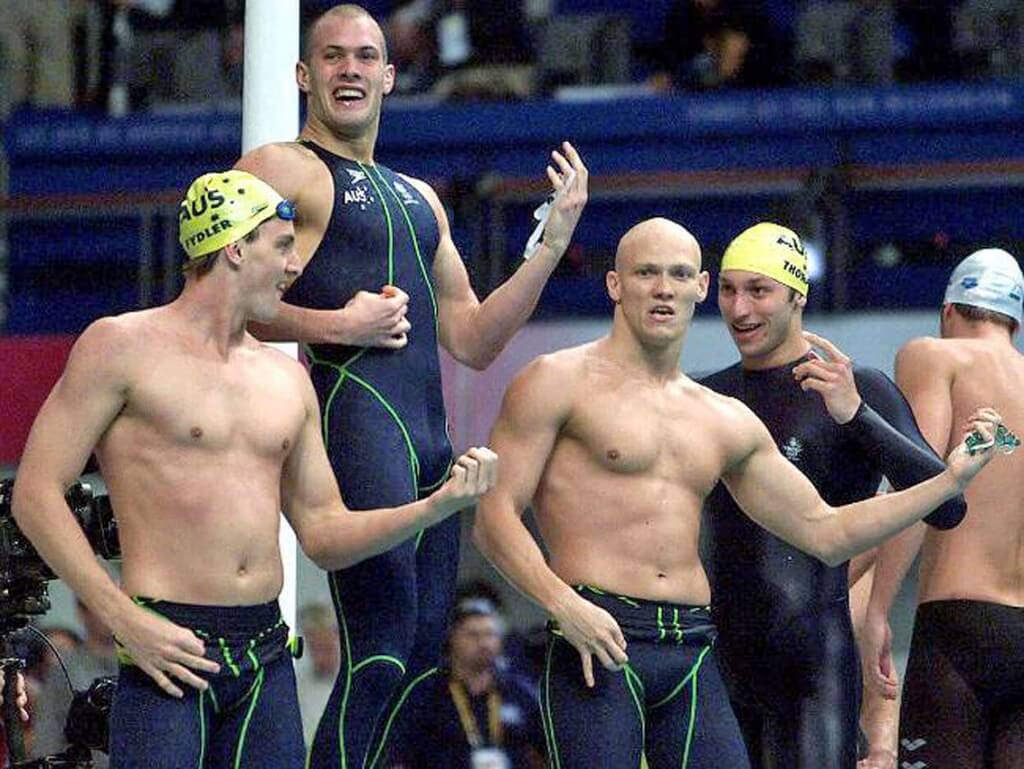A Guitar-Strumming Upset: Aussies Take Down Americans In 400 Free Relay At 2000 Olympics

By Jeff Commings, Swimming World Senior Writer
Fifteen years ago today, one of the most intense races in the history of Olympic swimming took place in the Sydney Aquatic Center in Australia to end the first finals session of the 2000 Olympic swim meet. With about 18,000 screaming Australians in attendance and a winning streak on the line, the stage was set for a battle between the Aussies and the Americans.
The Americans had never lost the 400 free relay at the Olympics. There have been close races, most recently in 1992 against the former Soviet Union, but the Americans always prevailed. The Australians had four men who presented a big opportunity to end that streak, though history wasn’t on their side.
Before the race, American Gary Hall Jr. said his team would “smash the Aussies like guitars.” The pre-race smack talk was nothing new for Hall, who had done the same thing to longtime rival Alex Popov at the 1996 Olympics. At those Games, Popov got the gold over Hall, and in Sydney, the overconfidence from Hall would be Team USA’s undoing.
The relay didn’t start off well for the United States. Michael Klim broke the 100 free world record with a 48.18 to give the Australians the advantage. Anthony Ervin split 48.89 on his opening leg, a seemingly unsurmountable gap for Neil Walker to overcome.
Walker used practically everything he had to catch Chris Fydler in the first 50 meters, and paid the price in the final strokes. Fydler regained the lead and gave Ashley Callus a comfortable cushion ahead of Jason Lezak.
Before Lezak’s name became a verb as a result of his amazing relay swim in the Beijing Olympics in 2008, he was a strong utility player on Team USA. He used the same strategy that Walker did, catching Callus quickly. Callus had a tough time breaking away from Lezak, but managed to do so in the final 10 meters.
At this point, it was Ian Thorpe against Hall. Thorpe had become an instant celebrity about an hour earlier with a world record and gold medal in the 400 freestyle at 17 years old. He wasn’t coming into the race fresh; Hall would be racing for the first time in the meet.
In the first 25 meters, it looked like Hall was going to shake up Thorpe with an aggressive start. Thorpe wasn’t responding in the same fashion as the three who went before him, letting Hall gain a half-body length lead going into the turn.
At this point, the noise in the facility was so loud it could probably be heard in downtown Sydney many miles away. With 25 meters left, it looked like Hall was going to give the Americans victory number eight in the relay. With 15 meters left, Hall’s kick faded, while Thorpe’s looked like a motorboat churning the waves.
With five meters to go, it was clear that the American streak was over. Thorpe’s long arms stopped the clock first, giving the Australians a world record of 3:13.67. The United States also dipped under their world record with a 3:13.86. Just nine hundredths of a second separated first and second. Hall outsplit Thorpe, 48.24 to 48.30, but it wasn’t enough to get the Americans the gold.
Video: 400 free relay final, 2000 Olympics
The crowd was going crazy. The Australian swimmers were going crazy. About 25 seconds into the celebration, Klim, Callus and Fydler imitated the act of strumming guitars in a mocking gesture toward Hall’s comment.
Coupled with Thorpe’s win in the 400 free earlier in the session, the Australians got a major boost in their swimming program. The men and women won 18 medals, the highest tally for Australian swimmers at an Olympics. That would hold until 2008, when the team won 20 medals.
Though the men’s 400 free relay from Beijing has since trumped Sydney’s relay as the top relay swim in an Olympics, what the Australians did in Sydney impacted a future generation of athletes who might not have thought the Americans were beatable in the relay. In the 2004 Olympics, the South Africans won the 400 free relay by more than a body length, and in 2012, the French overtook the Americans in the same way the Australians did in 2000. Australia got back to the top of the medal podium at the 2011 world championships on the strength of new leader James Magnussen, who could help the Australians get back on the Olympic podium in the relay in 2016.




My favourite of all times the great Michael Klim with his brilliant turns ?
Another great perspective on the race https://www.youtube.com/watch?v=d5eG80Hr9x8
The Aussies did okay at swimming that day, but they still sucked at air guitar.
Unforgettable race